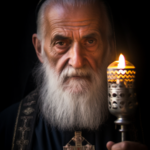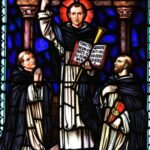St. Joseph Cafasso
St. Joseph Cafasso
When they lived:
St. Joseph Cafasso lived from January 15, 1811, to June 23, 1860.
Where they lived:
St. Joseph Cafasso was born and lived most of his life in Castelnuovo d’Asti, a picturesque town in the Piedmont region of northern Italy.
Notable world events during the time of their life:
- Industrial Revolution (1760-1840): The world was witnessing a period of significant industrialization, transforming economies and societies across the globe. New technologies like steam engines and mechanized factories were reshaping how people lived and worked.
- Italian Unification (1815-1871): During Cafasso’s lifetime, Italy was fragmented into numerous independent states and kingdoms. The Italian Unification movement, also known as the Risorgimento, sought to unify these regions into a single nation. The movement ultimately led to the establishment of the Kingdom of Italy in 1861, just a year before Cafasso’s death.
- California Gold Rush (1848-1855): In 1848, gold was discovered in California, triggering a massive migration of people from around the world to the region in search of riches. This event significantly impacted the development of the United States and contributed to its westward expansion.
- Publication of “On the Origin of Species” (1859): Charles Darwin’s groundbreaking work, “On the Origin of Species,” was published in 1859. The book introduced the theory of evolution by natural selection, revolutionizing the way people perceived the development of life on Earth.
- Crimean War (1853-1856): This war, fought primarily in the Crimean Peninsula, involved Russia against an alliance of the Ottoman Empire, Britain, France, and Sardinia. The conflict marked a significant shift in the nature of warfare and highlighted the importance of medical care and nursing for wounded soldiers.
Their patronage:
St. Joseph Cafasso is the patron saint of prisoners, students, and those condemned to death. He dedicated his life to ministering to prisoners and preparing them for a better life, both spiritually and socially. His compassion and guidance earned him the title of the “priest of the gallows,” as he accompanied many condemned prisoners in their final moments, offering solace and redemption.
The Life and Works of Joseph Cafasso
Joseph Cafasso was born with a deformed spine. He was the third child born out of a total of four children to peasant-class parents. From a young age, Cafasso always wanted to be a priest. In order to pursue this dream, Cafasso undertook his ecclesial studies in Turin and Chieri.
He successfully completed his ecclesial studies and became an ordained priest in the archdiocesan cathedral on September 21, 1833. He furthered his studies at the Turin College for a total of four months.
While furthering his studies, he met Luigi Guala, the co-founder of the Institute of St. Francis of Assisi. Joseph stayed connected to this college, progressing from student to, later, the successor to Guala’s position as college rector in 1848.
As Joseph Cafasso grew stronger in his spiritual leadership, he decided to join the Third Order of St. Francis. It was here that he became a teacher and taught the teachings of the Bible. While being a teacher, he never once ignored his duties as a priest. He aided those who came from poorer backgrounds by supplying them with books and other school supplies they needed to see their studies through to completion.
In 1836, he became a well-known figure for his work and teachings on moral theological subjects. He drew on various teachings from the French school as well as those of other notable academics such as Alphonsus Liguori and Francis de Sales. He also fought against the intrusions of the state into church affairs.
He was also well known for being as frugal as possible. He never smoked or drank anything other than water alone. He never complained about aches and pains, such as headaches or toothaches. He was noted for his early Mass at 4:30 every morning. Furthermore, he would often spend long hours in the chapel.
Joseph Cafasso was also noted for being a confessor and spiritual director. He guided people to found new religious institutions or congregations, helping the church meet the needs of the world as they saw fit. He also did extensive work in prisons. Here, he served as a comforter for those who were condemned to death. Due to this, he quickly gained the nickname “Priest of the Gallows.”
The most notable moment of his extensive work in the prisons was when he personally escorted a total of 60 prison inmates condemned to death to the gallows. Once they had confessed their sins and said their final words, they were given absolution. Following this, they were hung to their deaths. Joseph Cafasso often referred to those hung once given absoluteness as “hanged saints.”
The death of Joseph Cafasso
On June 23, 1860, at the age of 49, Joseph Cafasso passed away. He passed away from pneumonia. This pneumonia was coupled with several other complications. These complications include those from a stomach hemorrhage and congenital medical issues.
All he owned was bequeathed to the Little House of Providence, which was a religious order close to his heart that was founded decades before his passing. Pope Pius XII canonized Joseph Cafasso on June 22, 1947, at the Vatican City in Saint Peter’s Basilica. Furthermore, Pope Pius XII declared him the patron saint of all Italian prisoners on April 9, 1948.
5 Interesting Facts About St. Joseph Cafasso
- There is a monument erected in his honor in Turin.
- In 1968, a church in Rome was dedicated to him.
- His feast day is celebrated on June 23.
- The major shrine of Joseph Cafasso is located at Santuario della
Consolata, Turin, in Italy - He was beatified on May 3, 1925, by Pope Pius XII, in Saint Peter’s
Basilica in the Kingdom of Italy
Prayer to St. Joseph Cafasso
O God, Father of infinite goodness, you endowed your priest, Saint Joseph Cafasso, with outstanding gifts of charity and wisdom to train, according to Gospel principles, ministers of the word and reconciliation; grant to us, through his intercession, a sense of brotherly compassion, so that we may walk in holiness and justice all the days of our lives. We make our prayer through our Lord Jesus Christ, your Son, who is God and lives and reigns with you in the unity of the Holy Spirit, for ever and ever.
[https://archive.sdb.org/ENG/pdf/Cafasso_Colletta_Ufficio_en.pdf]{.ul}



